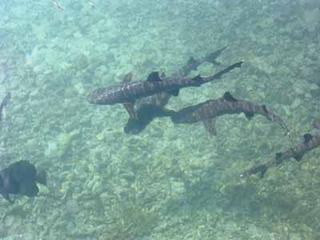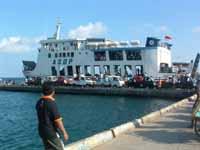Swimming with sharks on undisturbed Karimun

A convoy of vehicles, from cars to becak (pedicabs), disturbed a sedate Saturday afternoon on Karimun Jawa Island.
They took up position on the jetty in anticipation of the arrival of the Muria ferry from Jepara, part of the twice weekly service connecting the island and the Java mainland.
Karimun Jawa and 26 other islands are a district of Central Java's Jepara regency, divided into three subdistricts with a total population of some 4,000 families. Most are fishermen.
Located north of Jepara, Karimun Jawa is the main inhabited island, but there are also settlements on nearby Kemojan as well as Parang and Nyamuk islands.
Public facilities are limited, with only one junior high school (most students continue their education in Jepara).
Telephone service is limited to Karimun Jawa, with cellular phone access a goal for the future.
But part of the islands' potential tourist attraction is this remote, undisturbed quality, a relatively short distance from Java, one of the world's most crowded islands.
There are many diving sites around the islands, including shipwrecks.

Just across from the Karimun Jawa harbor, there is also a shark nursery on Menjangan Besar Island, which currently houses 10 black sharks.
"It is quite easy to take care of these baby sharks," said Mrs. Sum who is responsible for the nursery.
"We only need to feed them 3-4 times a week, with 10 kilograms of fish at each feeding time."
She added that Jakarta's Seaworld had acquired two white sharks from the nursery for its collection.
In contrast to white sharks, black ones are more passive and calm. A snorkling session with them proved that they are indeed retiring creatures.
In fact, they swam away.
There are also barracuda and carp in the nursery.
"These fish are for guests who are staying in the cottages," she said.
The cottages are simple and cheap, costing only Rp 45,000 (US$5.48) per night.
Karimun Jawa is home to the Kura-Kura Hotel and Hotel Wisata. Kura-Kura Hotel is owned by the Central Java provincial administration and managed by Kura-Kura Resort. Hotel Wisata is owned and managed by the Jepara regency administration.
A Kura-Kura Hotel staff member, Syaiful, told The Jakarta Post that the local administration should focus on developing the area to draw tourists.
 "Providing hotels alone is not enough and the authorities must also improve the access here," he said.
"Providing hotels alone is not enough and the authorities must also improve the access here," he said."I heard that they will operate a fast ferry next year which only takes three hours instead of eight."
The local fishermen also rent out their boats for visitors to cruise around the islands, with fares ranging from Rp 100,000 to Rp 200,000 depending on the length of the ride.
Promotions are needed to get the word out to prospective visitors.
For those who do make it to these parts, there are not many souvenirs to choose from. There are handicrafts made of seashells, such as key chains, pins and boxes, but the quality needs to be improved.
The island is also known for Dewa Daru wood which is believed to have powers as an amulet.
The problem is the wood is believed to be so sacred that no ships or planes will carry it on board.
A special ceremony is mandated to ask permission from the spirits who are said to guard the island and the wood.
With or without tempting souvenirs, a visit to this pristine island is worth all the hassle of getting there.
Published on The Jakarta Post on Sunday, June 1, 2003. Co-authored by Agustina Wayansari
0 Comments:
Post a Comment
<< Home